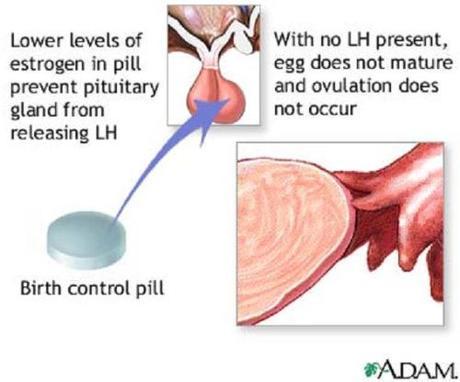
There are consequences to our actions.
And when it comes to a pill that some women take every day which contains powerful hormones of estrogen and progestogen that suppress fertility — the ovary’s production of eggs — why would we think that daily pill won’t have unintended effects on our bodies?
Nicole Kwan reports for FoxNews, Feb. 28, 2014, that a new study found an increased risk (30%) of multiple sclerosis (MS) among women who have taken oral contraceptives.
Multiple sclerosis is an autoimmune disease affecting the central nervous system which seem to especially strike females. The causes are unclear, but experts believe genetics, environmental hazards and smoking are all possible factors. The condition normally develops between ages 20 and 40.
The research sample
Researchers led by Dr. Kerstin Hellwig, a post-doctoral research fellow at Kaiser Permanente Southern California (KPSC), used membership data from KPSC to analyze the 2008-2011 health records of 305 women aged 14 to 48 who were diagnosed with MS or its precursor — clinically isolated syndrome (CIS) — as well as the women’s birth control use up to three years prior to the onset of MS symptoms.
Research findings
1. Overall, researchers found a 30% increased risk of developing MS amongst women who had at least three months of oral contraceptive use, compared to a control group of 3,050 women who did not have MS.
2. 29.2% of women with MS used birth control before their diagnoses, and 23% of women in the healthy control group used birth control– showing an increased risk with higher use of the drug.
3. Even for women who did not currently use an oral contraceptive but had in some time in the three years prior to being diagnosed, there was a slightly higher risk.
Hellwig noted that her team studied data for women who used oral contraceptives for at least three months, which limited the analysis because they weren’t able to study lifetime exposure. But she expects to see an increased risk with longer use in their final analysis, which will be presented at the upcoming American Academy of Neurology’s Annual Meeting. Most of the women used an estrogen and progestin formulation of birth control, a commonly used combination.
Researchers say use of birth control is not a firmly established cause for MS, but they do see a link. “It’s not clear what role [hormones] play in the development of the disease, but it’s clear that two to three times more women than men have MS,” Hellwig said.
Despite an increased M.S. risk of 30% from ingesting birth control pills, Hellwig nevertheless insists that “[We] don’t intend to mean that young women should avoid birth control to avoid MS.”
I’m not a medical doctor but here’s a common sense suggestion:
Instead of the pill, combine two or more non-invasive birth control methods, none of which has deleterious effects on health. They are the rhythm method, spermicide, and condom:
- On days immediately before, during, and immediately after ovulation, refrain from having intercourse.
- On the other days, use a spermicide and condom.
~Eowyn

